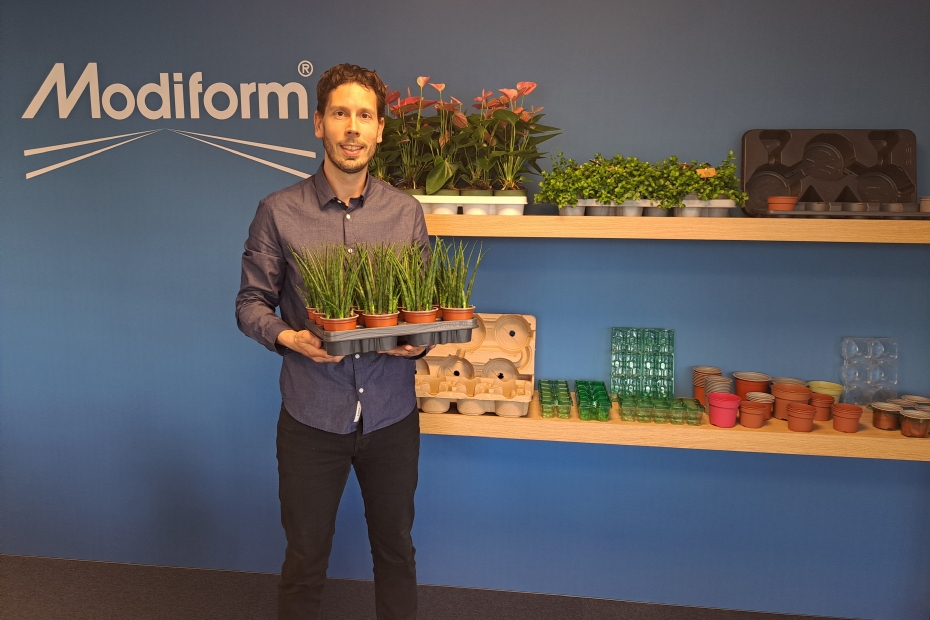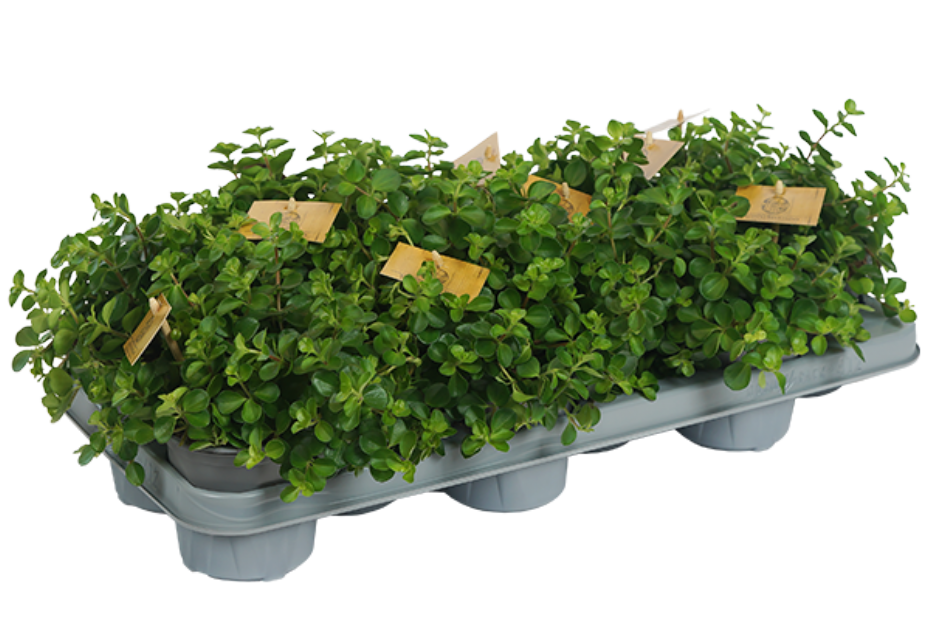Modiform focuses on transport trays made from pure PS material |
|
|
|
|
 |
| 239 sec |
Market embraces PS trays without added colorants
The transport trays from Modiform have undergone a significant transition in just over a year. While the trays were initially manufactured from recycled black and glossy polystyrene, they are now largely made from so-called pristine material. This material contains no colorants or glossy coatings, enabling the transport trays to fully meet the objective of 100% recyclability. Arie den Hertog from Modiform notes that the market has now widely embraced this approach. "The Pristine PS tray has become the standard."
| The Pristine tray is now the standard. |
In its tray product strategy, Modiform is primarily focused on Pristine, which currently serves as the base material for its transport trays. To put Pristine—the brand launched at the end of 2022—into context, Arie den Hertog, product management team leader at Modiform, dives into its origins.
"Modiform has traditionally produced its transport trays from recycled polystyrene (PS). These trays are widely used in nurseries due to the material's strength and high heat resistance, which makes it well-suited for thermoforming. This results in trays with a strong price-to-quality ratio. For example, PS is the standard material used for transport trays settled through Royal FloraHolland auctions. PS is the most commonly used plastic for trays in horticulture and nurseries."
As pure a plastic as possible
The most cost-effective PS material for trays is black in color. Den Hertog explains, "If you keep this material within the business-to-business or b2b circuit and collect PS separately as plastic, it can be excellently recycled by commercial recyclers. Modiform itself also retrieves recycled PS from the market, which is then regranulated for the production of new trays. We always used to make them from black PS. Most recycled material appeared dark, so we added black dye to achieve a uniform black color. We also applied a glossy layer."
Some years ago, Modiform decided to take a further step towards full circularity in the production of its transport trays. "We wanted a PS plastic stream that is as pure as possible—without black dye or glossy coating. We were curious about the results. It turned out that trays of good quality can also be produced this way. The result is a tray that is not fully black and has no gloss. You then have the purest possible recycled material, which may vary slightly in color depending on the recycled content. The color may approach black, or lean towards anthracite or gray."
 | | Arie den Hertog, product management team leader at Modiform |
|
|
"That way, you avoid adding unnecessary colorants and glossy layers. It may be less appealing visually, but why would you do that if the goal is to keep the cycle as pure as possible? We aim for the highest possible percentage of recycled material in our transport trays. We can now thermoform and market PS material without unnecessary additives. This is the now well-known Pristine, and part of its charm is that the color can vary. The recycled material, which is still fairly dark, determines the color."
Detectable tray
Den Hertog notes that all the material Modiform collects may still contain traces of the colorant carbon black. "But we no longer add it ourselves. If the market embraces this, materials will gradually become less dark. Black trays will still exist, but if kept within the b2b circuit, they can be easily separated and recycled. However, if such a tray ends up in a mixed plastics bin at retail, it won't be sorted and cannot be recycled. A dark transport tray should not be disposed of with other plastics. If a retailer wants to throw such a tray in with all the other plastic waste, then it must be a detectable tray. We offer a solution for that with our PS JustGrey—a light gray tray that is detectable by NIR detection systems used by recyclers."
|
|
"The stock of glossy black transport trays has been converted into Pristine trays, which contain no new material or color additives."
| |
|
Pristine as the standard
Eliminating additives marked a significant transition for Modiform. "The stock of glossy black transport trays has been completely converted to Pristine trays, which contain no new materials or color additives. It's pure PS material. 'Pristine' is a fitting name, as it means 'pure' or 'clean'."
Den Hertog observes growing awareness in the market regarding transport trays. "We have also converted Normpack trays—the standard for plant trays at the Royal FloraHolland auction—from black to Pristine. These meet the auction's quality standards, where load-bearing capacity is the main requirement. The TrayC system we developed with Landgard is also made from Pristine material. The German retail chain retrieves as many of these trays as possible, and some are even reused. So there are good initiatives on the road to circularity. The market seems to be embracing the Pristine tray, and I've never heard a negative remark about its color. That's also due to how we positioned the product: the recycled material determines the color of the tray."
 | | tray without additives |
|
|
Recyclability of trays
In addition to Pristine, Modiform also offers the aforementioned JustGrey—a light gray PS stream for trays. "This can be detected among mixed plastics. A grower or retailer who mixes all plastics together must therefore use a detectable tray. We can offer that with JustGrey as our standard, but also in white or transparent PS. The key is that we have Cyclos certificates proving their detectability. You can make claims, but you also need to prove them. The same condition applies here: trays must remain within the b2b loop. A transport tray that ends up with the consumer is too large to be recycled via household waste, regardless of its color. It's therefore important that retailers avoid giving plastic transport trays to consumers."
Finally, Den Hertog highlights ecoExpert—biodegradable products made from 100% recycled cardboard. This is a complete range of horticultural products that are fully biodegradable and recyclable after use. "This allows us to offer growers an alternative to plastic right at the start of the chain. This line also includes transport trays. So in addition to Pristine and JustGrey trays, we also offer another option for this tray segment. Consumers can take an ecoExpert tray home with them, as these trays can be recycled with paper and cardboard waste."
Closed loop commitment
Modiform has aligned its product policy with the so-called closed loop commitment. Den Hertog explains, "The ideal is that we can recover as much as possible from the market ourselves. That's why we offer materials that are detectable when mixed plastic waste is involved. It all helps close the materials loop. But in practice it's quite difficult, as we don't control the recycling streams and infrastructure. However, we closely monitor developments. One example is our research into which types of plastics are recycled from consumer waste in leading Western European countries. There are considerable differences. When we use light gray PS, we know in which countries it is recycled—such as Norway, Germany, Belgium, France, and Austria. Additionally, for example, transparent green PET from bottles is recycled in the Netherlands, Germany, Austria, and the UK. This allows exporting growers to consider which materials to use. We are happy to advise our customers on this. We see it as our duty at the beginning of the chain."
|
This article was previously published on 6 August 2024 on the Boom In Business website.
| LOG IN
with your email address to respond.
|
|
|
| There are no comments yet. |
|